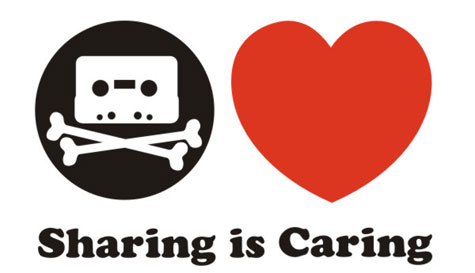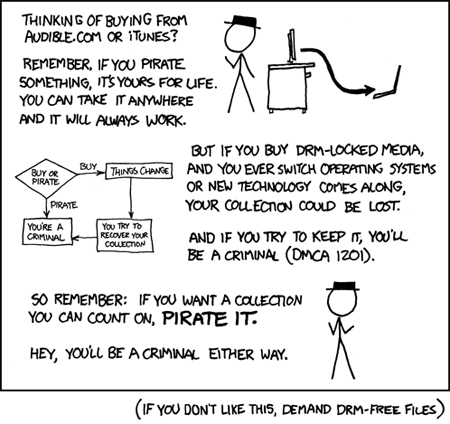So true, so true.
Category: intellectual property
Steal This Comic
xkcd: “I spent more time trying to get an audible.com audio book playing than it took to listen to the book. I have lost every other piece of DRM-locked music I have paid for.”
Stop global warming

Think you could help?
Lawrence Lessig on the “Age of prohibitions”
Great talk. Short, only 25 minutes. Don’t know who Larry Lessig is? Shame on you…
From TEDTalks.
Technology Wants To Be Free
The best read of the day, week or maybe even month:
In particular I’ve concluded the free is deeply entwined into the very foundation of technology. I was sharing some of those emerging half-baked thoughts with Chris in the lobby of TED. Since that conversation I’ve discovered that the tie between technology and the free goes even further than I thought. My current conclusion can be summarized simply: Technology wants to be free.
Let me state it more precisely: Over time the cost per fixed technological function will decrease. If that function persists long enough its costs begin to approach (but never reach) zero. In the goodness of time any particular technological function will exist as if it were free.
This seems to be true for almost anything we make: basic things like food stuffs and materials (often called commodities), and complicated stuff like appliances, as well as services and intangibles. The costs of all these (per fixed unit) has been dropping over time, particularly since the industrial revolution.
From Technology Wants To Be Free by Kevin Kelly.
As a bonus, a semi-follow-up called Better Than Free is also a great read.
And another bonus, in similar tune, by the same author Where Music: Will Be Coming From.
Apple against the DRM
While sensible and all, I was surprised when I’ve read it (despite it coming from Apple):
Why would the big four music companies agree to let Apple and others distribute their music without using DRM systems to protect it? The simplest answer is because DRMs haven’t worked, and may never work, to halt music piracy. Though the big four music companies require that all their music sold online be protected with DRMs, these same music companies continue to sell billions of CDs a year which contain completely unprotected music.
Source: Apple’s thoughts on music (via)
On intellectual property, again
It’s like with piracy: who cares if someone steals your application if they were never going to buy it in the first place?
Golden. The above quote was taken from the ars technica interview with Wil Shipley (of Delicious Monster).
Oh, and by the way, Merry Christmas!
Quote of the day
The big media companies shouldn’t worry that people will post their copyrighted material on YouTube. They should worry that people will post their own stuff on YouTube, and audiences will watch that instead.
So true. So true.
Can’t not create
Despite being written in 2000, it is still valid. Probably even more now than it was back then. And I could not agree more with Mark Pilgrim’s words:
As I write this, the year is 2000, and the Internet is a battleground of intellectual property disputes. Some people would like you to believe that, without proper financial incentives, music, literature, and computer software would disappear. After all, who would make music if they can’t make money on it? Who would write? Who would program? I know the answer. The answer is that musicians will make music, not because they can make money, but because musicians are the people who can’t not make music. Writers will write because they can’t not write. I’ve been programming for 16 years, writing free software for 8. I can’t imagine not doing this. If you can imagine yourself not doing what you’re doing, do something else. Do whatever it is that you can’t not do.
You don’t need money to create art. No matter what kind of art it is. Will we see the end of big record companies and even bigger movie studios? Or putting it another way, will we see more and more independent (and without any copyright burden) work gaining its momentum and being a commercial success for its creators? I certainly hope so.
(via plasmasturm)

